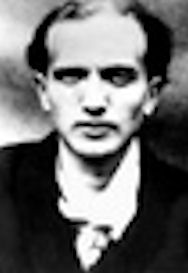nycBigCityLit.com the rivers of it, abridged


Articles
Spring 2010
Max Blecher (1909-1938): A Centenary Remembrance
by Valery Oisteanu
Last September 2009 the calendar struck 100 years since Max (Marcel) Blecher was born in Botosani, Romania. His meteoric life was one prolonged surreal adventure. His writings received much critical acclaim when they were first published in Andre Breton's literary review Le Surréalisme au service de la revolution.
Max Blecher was a Jewish Romanian writer and poet of unusual talent and vision, whose literary legacy remains invaluable. His life and creativity time was very short, less then a decade, but he experienced life and described it as one that lived to be a hundred.
He was diagnosed with spinal tuberculosis at the age of nineteen and spent the remaining ten years of his life mostly bedridden and practically immobile in a sanatorium in France, in a mummy like sarcophagus of plaster.
But actually his imagination ran wild and Blecher often fantasized having sex, even if incased in plaster casts as if doing something impossible and forbidden.
His narratives usually verge on romantic-memorialism but transcend into surrealism, almost accidentally. Such is a short story about riding the train to Berck in the south of France, a city that revolves around sanatoriums for spinal tuberculosis, and arriving at the train station in Berck for the first time. Instead of the usual hassle and bustle of the station, the landscape is populated by skeletal patients on crouches, wheel chair driven sick people, some totally horizontal and immobile.
In spite of his illness, Max continued to write, and during his lifetime published a volume of poetry and two novels, along with a number of short prose pieces, articles and translations.
He published only three books: Transparent Body (poetry, 1934), and two novels, Scarred Hearts (1936) and Happenings from Immediate Unreality (1937).
Another major work, "The Lighted Burrow: Sanatorium Journal" (Vizuina luminata: Jurnal de sanatoriu) was published posthumously in part in 1947 and in full in 1971.
He was praised by Eugene Ionesco, Mihail Sebastian, Geo Bogza and Sasha Pana, many of them comparing his prose to Franz Kafka, Bruno Schultz, Robert Walser or Thomas Mann, but fell into bleak obscurity during Romania's communist regime.
His death at the age of 29, (31 May 1938) in Roman, Romania was a "non-event", unworthy of an obit or a short notice in a local paper. Since the fall of the communism in 1989, Blecher's stature and renown as an author have grown steadily with the publication of new editions and collections of his writings, in new critical studies in Romania and outside Romania, such as translations in German, English, and Spanish.
An evening celebrating his centenary and the first English translations of his major works, with a theatrical piece in progress titled "The Knight with a Plaster-cast Armor" was performed for the first time on February 24 at the Salmagundi Club in New York with participation of avant-garde poets and actors Valery Oisteanu, Mirela Roznoveanu, Judy Altman, Max Blagg, Shelley Miller, Tom Walker, Ruth Friedman and Carlo Altomare on piano.
In the presence of New York's literati, in the last mansion on Fifth Avenue at Salmagundi Club, the words of immortal talent by Max Blecher resonated in the auditorium in Romanian and American and British accents, and lived again in the voices and music of today.
The fictional sequences were chosen from his novels, following his arrival to Berck, the Mecca of the sanatoriums, as a young patient (19 years old) and his adventures until the end of his life 10 years later.
A special musical score on the prepared piano, composed and interpreted by Carlo Altomare punctuated the reciting of his prose and fiction creating an avant-garde atmosphere.
I translated, with invaluable help of the editor and translator Nadia Brunstein, poems from Corp Transparent (Transparent Body) in English from the versions published in anthology assembled by Marin Mincu's "Avangarda Literara Romaneasca" in Editura Minerva.
Max Blecher's writings are as relevant today as they were 75 years ago because they reveal a human capacity to survive in virtual hell, to surpass death and to record the triumph over suffering. The French avant-garde recognized him and nurtured his writings. His work is reintroduced lately in Romania in several publishing houses, such as Editura Limes (Cluj-Napoca) and Editura Art from Bucharest, both of which published his novels.
For the English-speaking world Blecher was published recently for the first time ever in translations by Henry Howard (Scarred Hearts, Old Street Publishing, 2008) and Alistair Ian Blyth (Occurrence in Immediate Unreality, University Plymouth Press, 2009).
The reevaluation of Blecher's writings brings the value of Romanian writings in the 20's and 30's to the forefront of the Eastern European avant-garde and proves again the cultural connectivity with French surrealism, opening gates of a lost world that existed before the "cultural vandalism" of Communist censorship.
Valery Oisteanu is a writer and artist with an international background. Born in Russia in 1943 and educated in Romania, he adopted Dada and Surrealism as philosophies of art and life. Immigrating to New York City in 1972, he has been writing in English for the past 33 years. Oisteanu is the author of 10 books of poetry, a book of short fiction and a book of essays: "The AVANT-GODS."
For the past 10 years he has worked as a columnist at New York Arts Magazine and as an art critic for Brooklyn Rail and www.artnet.com. He is also a contributing editor at www.artscap.com and a contributing writer for French, Spanish and Romanian art and literary magazines including La Page Blanche, Art.es, Balkon, Dilema, Romania Literara.
As a performer Valery Oisteanu is well known to downtown New York City audiences, performing every season with the exception of the summer, when he goes on tour abroad. He is always well-received in theaters and clubs specializing in poetry and music where he presents original Zen Dada multi-media shows in his unmistakable style of "Jazzoetry."
